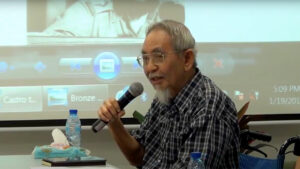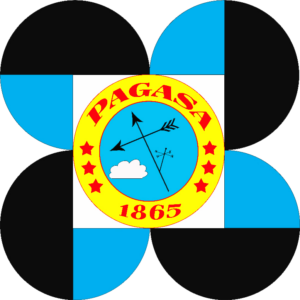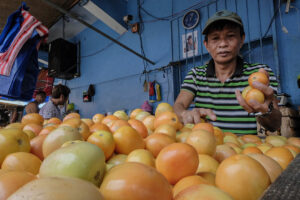It is an honor to give a eulogy for Dodong. In truth, I had written my eulogy — call it a eulogy for the living — which BusinessWorld published on Oct. 7, 2024. I wrote it upon learning about Dodong’s precarious health and confinement at the ICU. The premonition of death moved me to write my thoughts about Dodong.
That tribute was less about extolling Dodong’s Marxism and activism and his being an academic, public intellectual, and University of the Philippines (UP) President. My tribute was more about celebrating his multiple identities — including his being a folksy Cebuano, an avuncular figure, a good friend to many. More, it was about seeing how his different personas intertwined.
Yes, Dodong was a socialist, nay, a communist (he would emphasize, the small letter “c” to describe his being communist). But he was likewise a liberal and humanist. Yes, Dodong was firmly secular, but he would likewise bend to religious sentiments. Surely, the newly appointed Cardinal Ambo David would have not anointed and blessed a sick Dodong without consent.
What I cherish most about Dodong was his being fatherly to me and the student activists. Let me again share the story, which I narrated in my previous tribute for Dodong.
I met Dodong when he was the Dean of the UP College of Arts and Sciences. After his release from prison as a political detainee, Dodong returned to UP and soon assumed the deanship in 1976. This was the period of early Martial Law. Those early years were most dangerous. The dictatorship suppressed civil liberties. It restricted the right to free expression, the right to form associations, the right to assembly, the right to due process.
The UP campus was the target of suppression, for it was a nerve center of student activism. The dictatorship banned the Student Council and political mass organizations like the Kabataang Makabayan and Samahang Demokratiko ng Kabataan. The authorities prohibited protest actions, and State agents spied on students and harassed the activists.
Harassment of students on campus was commonplace. Students leading or joining legal mass actions or writing critical articles in the Philippine Collegian were jailed. Remember Ditto Sarmiento, Diwa Guinigundo, Fides Lim et al.
Those involved in illegal (or underground) political work faced graver risks. Many of those captured for participation in underground work (like possessing subversive paraphernalia or being members of cells) endured torture and long detention. Those who opted to take up arms believed naively in the inevitability of a victory, but they likewise accepted the fate of death.
I remember Billy Begg, the activist of Filipino-American descent who transferred to UP after being expelled from Ateneo. At UP, we were together as ROTC (Reserve Officers’ Training Corps) cadets. I noticed how serious he was about ROTC. I found this behavior bizarre. It turned out that the ROTC was Billy’s training to becoming a member of the New People’s Army (NPA). A few months later, after he silently dropped out from UP and joined the NPA, he died a brutal death.
This was the dark situation that Dodong dealt with when he became the dean of the College of Arts and Sciences (AS). As a high-level University official, he had to ward off the pressure from above. What made the situation more complicated was that his superiors were his friends. UP President O.D. Corpuz was his senior colleague at the College of Public Administration. There was a time that O.D. took care of Dodong’s growing son, Fidel. Emanuel Soriano, UP’s Executive Vice-President (EVP) and later President, was Dodong’s Cebuano migo (companion). In hindsight, we activists should have treated the likes of O.D. and EVP with respect and kindness.
More importantly, Dodong wanted to protect the students from the harm brought about by martial law. To the point, he was their comrade in the fight for rights and welfare and against the dictatorship.
Here, he was ingenious and imaginative. To get around the limits set by martial law, Dodong created new spaces and new forms of organizations. Using the aegis of academic freedom, Dodong made the AS the hub for students and faculty to have symposiums, exhibits, and plays. These innocuous looking activities served as cover to advance the struggle. Dodong also established the Third World Studies Center (TWSC), which became a focal point for radical thinking and studies. TWSC was a refuge for activists, including recently released political detainees who resumed schooling.
On a personal note, I wrote in my October 2024 column how Dodong showed fatherly concern and gave mature advice to us, the juvenile activists. Dodong recounted to me a tense moment sometime in 1977 when the chief of the dreaded Metrocom (Metropolitan Command of the Philippine Constabulary) warned him that the police would apply violent force (“break the skulls”) if the protesting students would pour out into the streets.
Dodong earnestly appealed to me (in my capacity as an officer of the Committee on Student Affairs) to avoid an escalation of the protest. As a principled compromise, he would allow the demonstration to continue within the premises of the AS and guarantee the safety of the students.
Dodong’s deep concern and affection, the affection of a father, caused me to follow his advice. Dodong prevailed upon us to act strategically and judiciously.
A long-time friend recalled that incident, which happened five decades ago. He asked me a question that apparently remained unanswered for him. “Why did I discourage the students from asserting their rights, from demonstrating on the street and confronting the military?” My response: “Let’s thank Dodong. I listened to Dodong. In hindsight, you and I would now agree that he was right.”
I end with a happier story. A story about Dodong, my late wife Mae and her mom, and UP.
Dodong was jubilant upon learning that Mae and I were getting married. Not exactly because he knew Mae that well. Dodong (and wife Princess) would see Mae as the chatty, quirky, friendly, and pretty daughter of Cil Manalang, herself a well-loved, highly esteemed UP professor. The Cil factor explained Dodong’s enthusiasm about our marriage.
Cil and Dodong had many things in common. They were campus neighbors (at Area 1), academic peers, and comrades in the broad progressive movement. They had mutual admiration and respect.
One collaboration between Dodong and Cil was a book project initiated by UP President SP Lopez in the early 1970s. SP Lopez selected a team of academics led by Dodong to write about UP and the Philippines in the 21st century. Dodong assigned to Cil the task of editing the manuscript.
In turn, Mama (Cil) let me read the manuscript. I remember that the chapter contributors, apart from Dodong (politics) and Cil (education), included Randy David (sociology), Ester Albano Garcia (chemistry and sciences), and Gon Jurado (economics).
Regrettably, the project dragged. The book remains unpublished, and the draft is missing.
But Dodong did not give up articulating his vision for the 21st century. In 2000, the late Laura Samson, a Sociology Professor greatly influenced by Dodong, supervised the publication of Dodong’s UP into the 21st Century and other Essays. This book is not as comprehensive or as overwhelming as the interrupted SP Lopez book project. Despite the narrow focus on UP education, UP into the 21st Century succeeds in provoking readers to rethink paradigms, norms, rules, and conventions. And it awakened readers to the challenge of collectively acting to transform Philippine education and society.
Dodong’s vision for UP in the 21st century is still far from reality. The 21st century nevertheless is still in its early stage.
But certainly, Dodong’s life and vision will guide us. Not only in following his espousal of societal change. Not only in pursuing Dodong’s goal to strengthen the natural sciences, the social sciences, and the humanities, and to forge their synergy. Not only in furthering Dodong’s aspiration for a continuously modernizing UP.
But I also wish to stress: Dodong’s life and vision will continue to inspire generations of students to embrace the world in all its dimensions and complexities. That is quintessentially Dodong. That is quintessentially UP.
Filomeno S. Sta. Ana III coordinates the Action for Economic Reforms.






